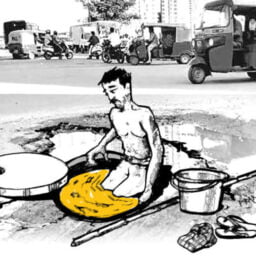INTRODUCTION
Tax, as has been used and prevalent from the pre-historic times, is “a compulsory contribution to state/central revenue, levied by the government on workers’ income and business profits, or added to the cost of some goods, services, and transactions.” It is generally a source of funds for the government for its monetary investment for the public good and is imposed by every government across the globe. Recently, in India, the Central Government slashed down the petrol and diesel rates by Rs. 10 and Rs. 5 on the occasion of Diwali, citing the reason that it is a boon to the farmers during the Rabi season for their oil consumption and a Diwali bonanza to the end-users that is the common citizenry. Though it is a promising step by the government of the day to assuage the burden of the end-users, the government at the same time has in many instances, misused the constitutional provisions on tax and in turn, has undermined the federal principles enshrined in the Constitution of India.
TAXATION SYSTEM IN INDIA CONCERNING PETROL AND DIESEL
India, a country with a mammoth population and diverse demography, has a complex taxation system where taxes are divided into direct taxes and indirect taxes. The country with 28 States and 8 Union Territories, works in consonance with each other, where the States, UT’S, and the Union impose taxes on the subclassification mentioned above. By Constitution (One Hundred and One Constitution Amendment) Act, 2016, Goods and Services Tax (GST) came into force in 2017 and upheld the indirect taxation system in India by integrating every indirect tax into a single book and being applied on every commodity, except on Petrol, Diesel, and Alcohol. As far as Petrol and Diesel are concerned, the Central Government levies Excise Duty or the central tax, and on the other hand, the State Government and the UT’S levy VAT (Value Added Tax) which is the state tax. Apart from this, there are other charges levied on Petrol and Diesel prices like Dealers’ charge, Dealer commission, cesses and surcharges by the union and state, etc.
Due to the labyrinth taxation policy on petrol and diesel across the country, different states have different incidental prices where the Excise Duty remains in uniformity and the VAT differs for different states (e.g.: the excise duty is Rs. 31.85/l and the VAT levied in Delhi is Rs. 25/l and in Mumbai, the VAT levied is Rs. 28/l, which makes the incidental prices of Petrol and Diesel different). Even the prices of Petrol and Diesel, apart from these charges, depend largely on global crude oil prices where the change in global oil price changes the rate of these commodities in different states differently.
LEGAL PROVISIONS ON TAXATION SYSTEM (PETROL AND DIESEL)
There have been numerable laws and constitutional provisions drafted by the lawmakers which tend to coordinate relations between the union and the states. Entry 54A of List 2 (State List) talks about the power of the state to “tax any commodity/good other than newspaper, but subject to the provisions of Entry 92A of List 1 (Union List).” Article 268 of the Indian Constitution says that “the duties mentioned in the Union List shall be levied by the Union Government but shall be collected and appropriated by the States and Union Territories”[1], with a clause that the duty leviable for the above article shall not form a part of the Consolidated Fund of India, but shall be assigned to the state. Similarly, Article 269 of the Indian Constitution says that “taxes on the sales or purchase of goods and taxes on the consignment of goods shall be levied and collected by the Union but shall be assigned to the States and Union Territories.”[2]
By the enactment of GST, two new amendments were made in the Constitution and two new Articles came into force. The first one on the list is Article 246A instituted by Constitution (One Hundred and One Amendment) Act, 2016[3] which says “Notwithstanding anything contained in Articles 246 and 254, Parliament, and, subject to clause (2), every State Legislature, have the power to make laws concerning goods and services tax imposed by the Union or by State.”[4] The next one on the list is Article 269A which says “Goods and services tax on supplies in the course of inter-State trade or commerce shall be levied and collected by the Government of India and such tax shall be apportioned between the Union and the States in the manner as may be provided by Parliament by law on the recommendations of the Goods and Services Tax Council.”[5]
LEGAL FIASCO AROUND THE TAXATION SYSTEM OF PETROL AND DIESEL
Though the makers of the constitution drafted many legal clauses and provisions about the taxation system of commodities like petrol and diesel, the same constitutional and legal provisions have been misused by the Union government in many instances which have ultimately undermined the federal principles on which, the foundation of Indian political system lies. Article 271 of the Indian Constitution says that “Notwithstanding anything in articles 269 and 270, Parliament may at any time increase any of the duties or taxes referred to in those articles except the goods and services tax under 246A by a surcharge for purposes of the Union and the whole proceeds of any such surcharge shall form part of the Consolidated Fund of India.”[6]
Even some entries in the State and Concurrent List which authorizes the state to levy taxes, duties, cesses, and surcharges get nullified by Article 249 and Article 250 which confers powers on the Union to “make laws even on matters mentioned in the State or Concurrent list if any inconsistency arises as mentioned in the latter article.” As per the data released from the Petroleum Planning and Analysis Cell (PPAC), the Union Government in a single FY21 has consolidated Rs. 3.72 Lakh Crore from the petroleum products only in which, “only around ₹18,000 crores is collected as Basic Excise Duty. Around ₹2.3-lakh crore is collected as cess and the rest ₹1.2-lakh crore is collected as special additional excise duty. The basic tax component of the entire ₹3.72-lakh crore is merely ₹18,000 crore, which is as low as 4.8% of the total revenue from petroleum products; the divisible pool is only 41% of this ₹18,000 crore.
Most importantly, cess and additional excise duty on petroleum products constitute around 95% of the total revenue from petroleum, which is not to be shared with the States at all.”[7] Thus, these constitutional provisions become a safe clause for the Union Government to undermine two aspects- firstly, it undermines the federal principles where, states have no say on cesses and surcharges if the same act gets confronted with the acts of Union, and secondly, the ned-user or the common citizenry have to face the brunt of this tax erosion. Though the Covid-19 Pandemic has wrecked every sector of the economy, the same excuse cannot be taken recurrently by the Union for its erroneous actions.
CONCLUSION
Article 1 of the Indian Constitution states that “India, that is Bharat, shall be a union of states.”[8] The same provision should be kept in cognizance by the lawmakers during policy formulation so that the federal structure of the Indian political system is not eroded by the same people. The constitution permits to levy of additional cess and surcharges but the same should be brought in force only in crippling circumstances or in the national interest. Many families have lost their breadwinners during the wroth of Covid-19 and many are still reeling under it and therefore, it becomes unfeasible if the Union continues the same acts. Hence, it is indispensable on the part of the government to reduce different domains of tax and formulate targeted framework in a phase-wise manner, and bear expenses of the state and the common detriment from its fund pool (Consolidated Fund of India).
Author(s) Name: Yash Singh (Chanakya National Law University, Patna)
References:
[1] Constitution of India, art 268
[2] Constitution of India, art 269
[3] 101 Constitutional Amendment Act 2016
[4] Constitution of India, art 246A
[5] Constitution of India, art 269A
[6] Constitution of India, art 271
[7] K.N. Balgopal, ‘A tax burden that attacks the federal rights of states’ (The Hindu, 11 November 2021) <https://www.thehindu.com/opinion/op-ed/a-tax-burden-that-attacks-the-federal-rights-of-states/article37446022.ece> accessed 13 November 2021
[8] Constitution of India, art 1
















